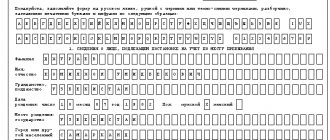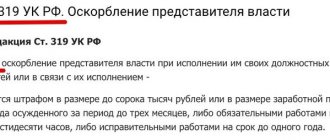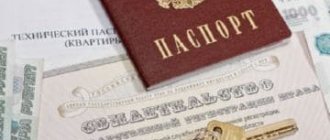Every foreign citizen who arrives in Russia must register at his place of residence or place of residence. To do this, you need to contact the migration authorities in person or through the receiving party. This procedure is not particularly difficult. For lack of registration under Article 322.2 of the Criminal Code of the Russian Federation in 2022, criminal liability is provided.
Form notification of the arrival of a foreigner in Russia
To register, it is enough to make copies of the documents with which the foreigner arrived in the Russian Federation and send them to the Federal Migration Service along with the notification of arrival. Notification of the arrival of a foreign citizen in the Russian Federation can be downloaded here.
However, even here there are many violations, and one of them is fictitious registration of foreign citizens. The detailed text of Article 322.2 of the Criminal Code of the Russian Federation can be found here.
Amount of fine and possibility of criminal prosecution
Criminal liability for fictitious registration is established in paragraph 2 of Article 322 of the Criminal Code. This norm establishes the following types of sanctions for those responsible:
Punishment in the form of a fine, which can range from 100,000 to 500,000 rubles.
- The same article of the Criminal Code provides for the recovery from the offender of his earnings or other income for the last 3 years as punishment.
- Violators can also be sentenced to forced labor for up to three years. In addition, he may be prohibited from holding any positions or engaging in certain types of activities.
- The most severe type of punishment is imprisonment. Its maximum term can be three years.
However, this article of the Criminal Code contains a note. It states that a person can be released from prosecution if they help solve the crime. True, his actions should not contain another crime.
Why are there difficulties with registration?
Registration at the place of residence can be either permanent or temporary. As a rule, foreign citizens receive registration of the second type. Its duration depends on the purposes and for how long the traveler from abroad arrived in Russia.
The minimum period for temporary registration is a month (although it happens that a guest asks to register for only a few days), and the maximum is limited to five years.
When a foreigner stays at a hotel or the inviting company handles his migration registration, problems usually do not arise. If a foreign citizen is staying with private individuals, they often refuse to register him at his place of residence.
This can be caused by various reasons. It's no secret how often real estate scams occur, and people are simply afraid: of becoming victims of fraud.
Some people simply don’t want the extra hassle, because the homeowner will have to go with the migrant to the Federal Migration Service and be present when submitting the application.
The application for a temporary residence permit can be downloaded on our website.
In such a situation, a foreign citizen begins to look for alternative options. And if there is demand, there will be supply: especially clever Russians began to offer such a service as fictitious registration of a foreign citizen. For the time being, no one thinks about punishment, however, if the deception is revealed, very severe penalties will follow.
Which registration is fictitious
Regular registration takes a minimum of time and poses virtually no threat to the homeowner. It consists in the fact that both the owner of the property and the foreigner must appear together at the migration authorities.
The first one must have a passport and a document confirming the right of ownership of the property. The foreigner presents an identity card and a migration card.
This is what a registration stamp looks like in the Russian Federation
The owner of the living space submits a corresponding application to the GUVM, and his guest receives a temporary registration stamp. At this point the procedure is considered complete. If it is followed correctly, a foreign citizen can apply for a labor patent. In this case, the place in which the migrant lives and his registration address must be identical.
If the owner does not want to register a new tenant, it is worth remembering that fictitious registration of a foreign citizen at the place of residence is subject to not only administrative, but also criminal liability.
In such cases, it is better not to take risks and look for other housing, the owners of which will be more accommodating.
But first you should try to convince the owner that temporarily registering another person in your living space does not threaten him with anything. At the end of its validity period, there is no need to go anywhere; the foreigner will be deregistered automatically.
By submitting an application, the owner simply notifies the migration authorities that other people are temporarily registered in his apartment.
The following cases fall under the concept of fictitious registration:
- When a person knowingly provides false information or fake documents.
- When a foreigner registered at his place of stay, the owner of the premises did not intend to provide him with his housing.
- If a migrant registered at his place of stay, although he knew that he would not live there.
For fictitious registration of foreign citizens, the fine is from 100,000 to 500,000 rubles.
Punishment for fictitious registration of foreign citizens in this case is borne by both: the migrant and the one who registered him. An official who allowed a fictitious registration will not be able to avoid it either, if it is established that this happened intentionally.
PLENATURE OF THE SUPREME COURT OF THE RUSSIAN FEDERATION
DECISION of July 9, 2022 N 18
ON JUDICIAL PRACTICE IN CASES OF ILLEGAL CROSSING OF THE STATE BORDER OF THE RUSSIAN FEDERATION AND CRIMES RELATED TO ILLEGAL MIGRATION
In order to ensure uniform application by courts of legislation on criminal liability for illegal crossing of the State border of the Russian Federation, organizing illegal migration, fictitious registration of citizens of the Russian Federation at the place of stay or at the place of residence in a residential area in the Russian Federation, fictitious registration of foreign citizens or stateless persons at place of residence in a residential building in the Russian Federation, as well as fictitious registration of foreign citizens or stateless persons at the place of stay in the Russian Federation (Articles 322, 322.1, 322.2, 322.3 of the Criminal Code of the Russian Federation) Plenum of the Supreme Court of the Russian Federation, guided by Article 126 The Constitution of the Russian Federation, Articles 2 and 5 of the Federal Constitutional Law of February 5, 2014 N 3-FKZ “On the Supreme Court of the Russian Federation”, decides to give the following clarifications to the courts:
1. Draw the attention of the courts to the need, when considering criminal cases of crimes provided for in Articles 322, 322.1, 322.2, 322.3 of the Criminal Code of the Russian Federation (hereinafter referred to as the Criminal Code of the Russian Federation), to take into account the requirements of the legislation of the Russian Federation regulating the rules for crossing the State border of the Russian Federation, entry into The Russian Federation, travel through the territory of the Russian Federation, stay on the territory of the Russian Federation and departure from the Russian Federation, contained in the Laws of the Russian Federation dated April 1, 1993 N 4730-I “On the State Border of the Russian Federation”, dated June 25, 1993 N 5242- I “On the right of citizens of the Russian Federation to freedom of movement, choice of place of stay and residence within the Russian Federation”, Federal Laws of August 15, 1996 N 114-FZ “On the procedure for leaving the Russian Federation and entering the Russian Federation”, dated July 25 2002 N 115-FZ “On the legal status of foreign citizens in the Russian Federation” and dated July 18, 2006 N 109-FZ “On migration registration of foreign citizens and stateless persons in the Russian Federation”, as well as in the acts of the President adopted in their development Russian Federation and the Government of the Russian Federation.
2. Socially dangerous acts provided for in Article 322 of the Criminal Code of the Russian Federation consist of crossing the State Border of the Russian Federation (hereinafter referred to as the State Border) while passing border control at checkpoints or crossing the State Border outside such points under the circumstances specified in Part 1 or Part 2 of this article of the Criminal Code of the Russian Federation.
3. In part 1 of Article 322 of the Criminal Code of the Russian Federation, valid documents for the right to enter or leave the Russian Federation should be understood as documents issued in the prescribed manner identifying a citizen of the Russian Federation, a foreign citizen or a stateless person (passport, foreign passport, diplomatic or service passport, residence permit in the Russian Federation, etc.), as well as other documents recognized in this capacity by international treaties of the Russian Federation, federal laws, decrees of the President of the Russian Federation or decrees of the Government of the Russian Federation (for example, a temporary document identifying the owner and giving the right to enter (return) to the Russian Federation or to another state (certificate of return), refugee travel document).
An appropriate permit obtained in the manner established by the legislation of the Russian Federation means, in particular, a permit issued by an authorized state body to enter the Russian Federation and stay in the Russian Federation or transit through the territory of the Russian Federation (visa), a permit for local border movement, permission from the Government of the Russian Federation or a border authority (for the purpose of repeatedly crossing the State Border, for carrying out work on the State Border, etc.).
4. As crossing the State Border without valid documents for the right to enter or leave the Russian Federation, liability for which is established by Part 1 of Article 322 of the Criminal Code of the Russian Federation, the specified actions of a person committed with the use of deliberately forged (forged) documents (for example, documents containing false information about the identity of the owner, including his last name, first name, patronymic, date of birth, as well as documents forged in any other way) or using genuine documents belonging to another person, as well as those committed when the person does not have any documents on the right to enter or exit the Russian Federation.
Part 2 of Article 322 of the Criminal Code of the Russian Federation qualifies crossing the State Border with passing border control at checkpoints or crossing the State Border outside such points by a foreign citizen or stateless person in respect of whom there is a valid decision of the authorized authorities prohibiting these persons from entering the Russian Federation under on the grounds provided for by the legislation of the Russian Federation, including a decision on the undesirability of stay (residence) in the Russian Federation, a decision on imposing an administrative penalty in the form of administrative deportation from the Russian Federation, a decision on deportation.
5. Taking into account the definition of the State Border contained in Article 1 of the Law of the Russian Federation of April 1, 1993 N 4730-I “On the State Border of the Russian Federation”, the crimes provided for in Article 322 of the Criminal Code of the Russian Federation are recognized as completed from the moment the person actually crosses the State Border regardless from the place and method of crossing it (on foot, by any type of transport, secretly or openly, with or without passing through border control at the checkpoint across the State Border).
6. Courts should keep in mind that the crimes specified in Article 322 of the Criminal Code of the Russian Federation can only be committed with direct intent, in which the offender realizes that he is crossing the State Border without valid documents for the right to enter or leave the Russian Federation or without proper permission obtained in accordance with the legislation of the Russian Federation, as well as the fact that he crosses the State Border when entering the Russian Federation in cases where he, as a foreign citizen or stateless person, is obviously not allowed to enter the Russian Federation on the grounds provided for by law Russian Federation.
The awareness of a foreign citizen or stateless person about the ban on entry into the Russian Federation can be evidenced by the presence in the identity document of a mark on the ban on entry into the Russian Federation, provided for in Part 2 of Article 27 of the Federal Law of August 15, 1996 N 114-FZ “On the procedure for leaving the Russian Federation and entering the Russian Federation", handing over to a person, against signature, a notification of acceptance regarding his decision to not allow entry into the Russian Federation or drawing up an act of refusal to receive this notification, etc.
7. In Article 322.1 of the Criminal Code of the Russian Federation, the organization of illegal migration is understood as the intentional commission of actions that create conditions for one or more foreign citizens or stateless persons to carry out illegal entry into the Russian Federation, illegal stay in the Russian Federation, illegal transit passage through the territory of the Russian Federation, including entry into the Russian Federation of foreign citizens on tourist visas for the purpose of illegal migration to another state using the territory of the Russian Federation as transit.
The organization of illegal migration is qualified as a completed crime from the moment the guilty person deliberately creates conditions for foreign citizens or stateless persons to carry out at least one of the illegal actions listed in this article, regardless of whether they have committed such actions or not.
The qualification of a person’s actions under Article 322.1 of the Criminal Code of the Russian Federation is not affected by the fact that foreign citizens or stateless persons in whose interests this crime was committed were not brought to justice, including due to their location outside the Russian Federation.
8. If the organization of illegal migration, along with other actions of an organizational nature, includes fictitious registration (registration) of foreign citizens or stateless persons at the place of residence or place of stay in the Russian Federation, the act shall be classified as a set of crimes provided for in the relevant part of Article 322.1 of the Criminal Code of the Russian Federation and Article 322.2 of the Criminal Code of the Russian Federation or Article 322.3 of the Criminal Code of the Russian Federation. In cases where the actions of a person consist only of fictitious registration (registration) of a foreign citizen or stateless person at the place of residence or place of stay, the act is qualified under Article 322.2 or Article 322.3 of the Criminal Code of the Russian Federation and does not require additional qualifications under Article 322.1 of the Criminal Code of the Russian Federation.
9. Creation with a single intent of conditions for a foreign citizen or stateless person to commit several violations of migration legislation specified in Part 1 of Article 322.1 of the Criminal Code of the Russian Federation (for example, illegal entry into the Russian Federation and illegal stay on the territory of the Russian Federation), as well as for committing one or Several such illegal actions simultaneously by two or more foreign citizens or stateless persons should be qualified as one crime provided for in the relevant part of Article 322.1 of the Criminal Code of the Russian Federation.
10. Organization of illegal migration for the purpose of committing a specific crime on the territory of the Russian Federation with the participation of or in relation to foreign citizens or stateless persons, including in cases where the foreign citizens or stateless persons themselves were not aware of their participation in the commission of this crime , is fully covered by paragraph “b” of part 2 of article 322.1 of the Criminal Code of the Russian Federation. If a person who organized illegal migration for such purposes took part in the commission of the specified crime, then his actions, if there are grounds, are classified as a set of crimes provided for in paragraph “b” of part 2 of Article 322.1 of the Criminal Code of the Russian Federation and the corresponding article (paragraph, part of the article) of the Special Part Criminal Code of the Russian Federation.
11. The actions of a person who organized the illegal entry into the territory of the Russian Federation of foreign citizens or stateless persons by illegally crossing the State Border are covered by the relevant part of Article 322.1 of the Criminal Code of the Russian Federation and do not require additional qualifications under Part 3 of Article 33 and Article 322 of the Criminal Code of the Russian Federation.
If the person who organized illegal migration, while committing this crime, illegally crossed the State Border (for example, acting as a guide), then his actions are subject to qualification under a set of crimes provided for in Articles 322 and 322.1 of the Criminal Code of the Russian Federation.
12. When considering cases of crimes for which liability is established by Articles 322.2 and 322.3 of the Criminal Code of the Russian Federation, courts must be guided by the definitions of the concepts of place of residence and place of stay, fictitious registration (registration), as well as other provisions contained in Article 2 of the Law of the Russian Federation dated June 25, 1993 N 5242-I “On the right of citizens of the Russian Federation to freedom of movement, choice of place of stay and residence within the Russian Federation” and in Article 2 of the Federal Law dated July 18, 2006 N 109-FZ “On migration registration of foreign citizens and stateless persons in the Russian Federation."
13. Within the meaning of Article 322.2 of the Criminal Code of the Russian Federation, fictitious registration of a citizen of the Russian Federation at the place of stay or place of residence or fictitious registration of a foreign citizen or stateless person at the place of residence is the recording in the prescribed manner by the registration (migration) accounting authorities of the fact of the presence of a citizen of the Russian Federation in the place his stay or place of residence in a residential building in the Russian Federation, the fact that a foreign citizen or stateless person is at his place of residence in a residential building in the Russian Federation on the basis of submitting knowingly false information or documents for such registration to these authorities, or in the absence of data persons intend to stay (reside) in this premises, or if the owner or tenant of the residential premises does not have an intention to provide this residential premises for the stay (residence) of these persons.
Fictitious registration of a foreign citizen or stateless person at the place of stay, responsibility for which is provided for in Article 322.3 of the Criminal Code of the Russian Federation, consists of recording in the prescribed manner by migration registration authorities the fact of the presence of a foreign citizen or stateless person at the place of stay in premises in the Russian Federation on the basis submission of knowingly false information or documents to these authorities, or in the absence of these persons’ intention to actually reside (stay) in this premises, or in the absence of the receiving party’s intention to provide them with this premises for actual residence (stay), or in recording the fact of the presence of a foreign a citizen or stateless person at the place of residence at the address of the organization in which they do not, in accordance with the established procedure, carry out labor or other activities not prohibited by the legislation of the Russian Federation.
Acts provided for in Article 322.2 or Article 322.3 of the Criminal Code of the Russian Federation are qualified as completed crimes from the moment the registration (migration) authorities record these facts.
14. Taking into account the fact that the crimes provided for in Articles 322.2 and 322.3 of the Criminal Code of the Russian Federation can only be committed with direct intent, the employee of the registration (migration) registration authority who has registered (registered) a citizen of the Russian Federation, a foreign citizen or a stateless person, bears criminal liability for the committed act if he realized the unreliability (falsity) of the information or documents submitted for registration or registration or the presence of other circumstances preventing registration (registration).
The owner or tenant of the relevant residential premises, a person authorized by them, a manager or other authorized employee (member) of an organization in which a foreign citizen or stateless person does not carry out labor or other activities not prohibited by the legislation of the Russian Federation in the prescribed manner, or other persons acting on behalf of on their behalf, may be subjects of a crime under Article 322.2 or Article 322.3 of the Criminal Code of the Russian Federation, if they submitted knowingly unreliable (false) information or documents to the registration (migration) authorities for registration (registration), or when submitting information or documents they were aware of the presence other circumstances preventing registration (registration).
15. If the single intent of the guilty person included the fictitious registration (registration) at the same place of stay or place of residence of two or more citizens of the Russian Federation, foreign citizens or stateless persons at the same time, what he did constitutes one crime, provided for in accordance with Article 322.2 or Article 322.3 of the Criminal Code of the Russian Federation.
16. When considering cases of crimes for which liability is established by Articles 322 - 322.3 of the Criminal Code of the Russian Federation, the court, having established facts of illegal crossing of the State Border, organization of illegal migration, fictitious registration of citizens of the Russian Federation at the place of stay or at the place of residence in a residential premises in the Russian Federation , fictitious registration of foreign citizens or stateless persons at the place of residence in a residential building in the Russian Federation, or fictitious registration of foreign citizens or stateless persons at the place of stay in the Russian Federation, is obliged to cite articles, parts of the article, in the verdict of guilty or other final decision, clauses of regulatory legal acts regulating the rules for crossing the State Border or registration (registration) at the place of stay (place of residence) in the Russian Federation, violated by the guilty person, indicating what exactly the corresponding violation was.
17. In the note to Article 322.2 of the Criminal Code of the Russian Federation and in paragraph 2 of the notes to Article 322.3 of the Criminal Code of the Russian Federation, one should understand the actions of a person committed both before the initiation of a criminal case and after the institution of a criminal case against a specific person or upon the commission of a crime. and aimed at assisting the preliminary investigation authorities in establishing the time, place, method and other circumstances of the commission of the crime, the participation of the person himself in it, as well as in exposing accomplices to the crime. The question of the presence or absence of grounds for releasing a person from criminal liability in accordance with the note to Article 322.2 of the Criminal Code of the Russian Federation or paragraph 2 of the notes to Article 322.3 of the Criminal Code of the Russian Federation in each criminal case is decided by the court depending on the nature, content and scope of the actions committed by the person, and also their significance for establishing the circumstances of the crime and exposing the persons who committed it, with the reasons for the decision being given in the court decision.
The release of a person from criminal liability for committing a crime under Article 322.2 or Article 322.3 of the Criminal Code of the Russian Federation, on the basis of notes to these articles, does not prevent the prosecution of this person for other illegal actions committed by him, if they are subject to independent qualification (for example, for organizing illegal migration, falsification of a citizen’s passport for the purpose of using it).
18. When making a legal assessment of actions involving the organization of illegal migration without qualifying characteristics (Part 1 of Article 322.1 of the Criminal Code of the Russian Federation) or fictitious registration (registration) at the place of stay or place of residence, the courts must take into account the provisions of Part 2 of Article 14 of the Criminal Code RF that an action (inaction), although formally containing signs of any act provided for by criminal law, but due to its insignificance does not pose a public danger, is not a crime. When deciding whether an act is minor, courts need to take into account, in particular, the motive and purpose that guided the accused (defendant), his relationship with the person in connection with whom the provisions of migration legislation were violated (for example, when fictitiously registering a loved one relative at the place of stay or at the place of residence in a residential building in the Russian Federation).
19. Recommend that courts, when considering criminal cases of crimes related to illegal crossing of the State Border and (or) illegal migration, identify the circumstances that contributed to the commission of these crimes, violation of the rights and freedoms of citizens, as well as other violations of the law committed during the preliminary investigation or when considering a criminal case by a lower court, and in accordance with Part 4 of Article 29 of the Criminal Procedure Code of the Russian Federation with private rulings (decisions), draw the attention of relevant organizations and officials to them.
Chairman of the Supreme Court of the Russian Federation V.M. LEBEDEV
Secretary of the Plenum, Judge of the Supreme Court of the Russian Federation V.V. MOMOTOV
Penalties for fictitious registration
Despite the strict punishment, thousands of such cases are observed in Russia every year. It is reckless to hope that they won’t get caught: unlike some other government agencies, Russian migration authorities work perfectly.
Employees often conduct raids, and neighbors often report the possible presence of illegal residents.
In identifying illegal immigrants, they have the right to use a variety of measures: checking against registration databases, requesting documents on rental housing, interviewing all suspects, as well as forensic examination of documents.
All this makes it possible to identify the fictitiousness of registration, if it took place. So before you decide to take such a risky step, you need to know what the risks are.
How to check if the registration procedure has been followed
Despite the large number of violations, there are a lot of conscientious foreign citizens living in Russia. Often people are interested in how to check whether the registration is fictitious and whether the guest is registered at all.
The best way to avoid trouble is not to contact various fly-by-night companies that advertise on the Internet with offers to quickly obtain temporary or even permanent registration.
There are a huge number of cases where people who are already in a difficult situation have lost their last money due to such extortionists. The employer, hotel administration or owner of the accommodation where the foreign guest is staying must register.
Certificate of temporary registration
In this case, the migrant must be given a certificate of temporary registration, which specifies its validity period. If you still have doubts, you need to ask to know which department of the Main Directorate for Migration Affairs the representatives of the receiving party contacted.
Of course, officials will not provide such information over the phone, but it’s worth taking a little time and going there in person. Since many issues are now resolved through the MFC and the State Services portal, the queues at migration departments have become much shorter.
How to declare registration illegal?
How to check the authenticity of registration?
If violations are detected during registration, grounds arise for declaring it illegal.
However, the procedure for recognizing the fictitiousness and illegality of registration can only be carried out in court.
If the legal owner (tenant) of the property has found extra tenants in the housing and communal services receipt, then he needs to understand this situation.
Most often, they have to file applications to evict illegally registered residents and deregister them. Neighbors, local police officers and registration authorities can also identify cases of fictitious registration.
To submit such an application, you need to collect evidence that your existing registration is fictitious. Next, you need to fill out the application correctly and submit the corresponding demand to the judicial authority.
Tenants (owners) of apartments, their neighbors, local police officers or employees of the authorities registering residence can submit such an application.
If, upon examination, the fact that the registration is fictitious is confirmed, the violator will be deregistered on the basis of an act issued by the court. In practice, courts consider quite a lot of such cases. Most often, demands are made to remove fictitious residents from the register.
What threatens those who do not live according to registration?
Since in Russia, unlike many other countries, there is an institution of registration, the law has a negative attitude towards situations when one of the citizens does not live at the place of registration, but is, for example, in another city. However, such cases are not uncommon, and it is impossible to track them all.
Officially, a fine of 2,000 rubles is imposed for living outside your registration.
Moreover, this can be quite difficult to prove. If you don’t come into conflict with the local police officer or scandalous neighbors, you can live like this for years (meanwhile, the officially permitted period of residence without registration is limited to 3 months).
However, this causes certain inconvenience to the resident.
Without a permanent residence permit, it is difficult to get a normal job; without it, you will not be able to obtain a Taxpayer Identification Number (TIN), register an individual entrepreneur, or enroll your child in school.
In addition, if the violation is discovered, you will have to pay an administrative fine of 2,000 to 3,000 rubles. In the capital, fines will be even higher.
Is it possible to be somewhere other than where you live?
On the one hand, the law recognizes registration without the intention of living in the specified apartment as fictitious.
On the other hand, the same 1993 Law states that if a citizen moves within one subject of the federation, or moves from the Moscow region to Moscow, then this frees him from the obligation to register again.
If we look at this situation not from a legal, but from a practical point of view, then the attention of law enforcement agencies is focused mainly not on citizens of the Russian Federation, but on foreigners, including those from neighboring countries. Therefore, if you, living in a regional center, are registered in another district of the same region, you should not expect troubles from the FMS.
If you arrive in another subject of the federation and do not go through the registration procedure, expect that you will be required to pay a fine of up to five thousand rubles. Without leaving your region, you don’t have to be afraid of anything.
You will find even more nuances about registration in our materials. Read about living without registration at your place of residence, as well as what the penalty is for not having this mark.
Features of the application of punishment
The article of the Criminal Code, which provides punishment for fictitious registration, is often used, however, imprisonment is still considered a last resort. In addition, there are no established rules regarding who should serve such a sentence - the migrant or the homeowner.
Most often, the owners have to answer, but first law enforcement agencies must prove that the person intentionally violated the law.
It should not be surprising that the Criminal Code establishes such strict standards. In the practice of law enforcement agencies, there have been many cases where migrants have committed offenses and even crimes.
If they do not live at their place of registration, their search can take a very long time. So, in many ways, strictness towards those responsible for fictitious registration is a necessary security measure.
For this reason, one should not expect a weakening of liability for such offenders. Foreign citizens in such cases face heavy fines and deportation from the country. In addition, a ban on entry into Russia may be imposed for a certain number of years.
What is illegal registration in your apartment
The rules for registering citizens are contained in Federal Law 5242-1 of 1993. It states that a person is required to register at his place of residence if it differs from the place of his actual registration. A similar requirement applies to foreign citizens who are required to register on Russian territory after crossing the border.
If Russians have 90 days to complete registration procedures, then foreigners have up to 7 days.
This rule is used by many property owners who have made illegal registration a source of their income. In practice, this has led to the emergence of so-called “rubber apartments”, in which dozens of people are illegally registered.
Representatives of the migration service and law enforcement agencies are involved in identifying such apartments, although this can be very difficult to do. Usually they detect the fact of an offense through reports from other owners in the apartment, vigilant neighbors or the district police officer.
If the number of registered persons significantly exceeds the number of actual residents, this indicates illegal registration.
Also, FMS specialists control that those registered in one apartment have a certain number of square meters according to the standard.
If the latter indicator is greatly underestimated (for example, each resident has less than 5 sq.m.), then this serves as a signal that the residents are fictitiously registered in the apartment and do not actually live there.
Illegal registration means registration of a person in an apartment:
- committed in circumvention of the current rules: using forged documents or without obtaining the consent of other owners of the residential premises;
- if the registered persons do not have any intention to reside at this address;
- in case of violation of registration deadlines;
- if the owner has no desire to allow registered people into his apartment.
It is important to consider that only a court has the right to declare registration illegal.






